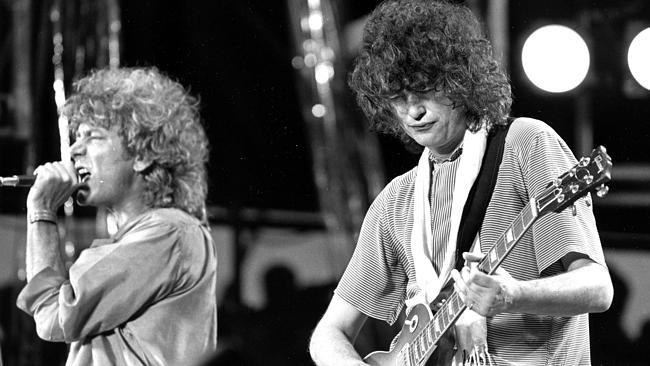Led Zeppelin copying claims: so rock’n’roll
Led Zeppelin are accused of stealing their iconic Stairway to Heaven riff but unconscious imitation is the lifeblood of pop.

Stairway to Heaven is what the Germans call an ohrwurm (earworm): a song so catchy that it burrows into the mind, endlessly playing and replaying long after the listener has forgotten where it comes from.
Robert Plant and Jimmy Page of Led Zeppelin now stand accused of stealing the introduction to the song from a lesser-known psychedelic band, in a case that revolves in large part around musical memory.
Did Led Zeppelin knowingly lift the opening chords of the 1971 classic from Spirit’s 1968 instrumental Taurus? Is Stairway to Heaven creatively independent of the earlier song? Or was the tune simply absorbed unnoticed into Page’s mind, a sliver of obscure musical memory that later emerged in modified form?
The similarities are obvious: both songs feature an acoustic guitar, an A-minor arpeggio played in a descending pattern, and comparable tempo. Yet whereas the arpeggio in Stairway resolves, rounding off the introductory passage, that on Taurus does not. What makes the former so memorable (and the latter so forgettable) is the sweet, plaintive melody played on top. It is immeasurably better music.
The Led Zep case is part of a new blizzard of litigation in which singers and songwriters are suing one another over alleged plagiarism more often, and for higher sums, than ever before. Last year a jury found that Robin Thicke and Pharrell Williams had copied Marvin Gaye in their 2013 hit Blurred Lines and awarded Gaye’s heirs dollars 7.4 million.
The lawyers are slavering because musical originality is so hard to prove and the potential for interpretation, and therefore profitable litigation, is almost endless.
More than any other art form, the composition of music depends on listening to and reinterpreting the work of others. The pop music industry has always been prey to cryptomnesia, the psychological condition whereby a forgotten memory returns without being recognised as such and is experienced as an original thought rather than a retrieved idea.
All music involves patterns. Any tune that follows a musical scale is limited by the notes available. This is particularly true of the restricted musical palette of pop music. “There was really just one song ever written,” said Keith Richards in 1993. “And that was by Adam and Eve. We just do variations.”
Echoes of Stairway’s chords can be found in works by Chopin, Vivaldi, Pachelbel and many other classical composers. Lawyers for Plant and Page have pointed out that the chimney sweep’s song Chim Chim Cher-ee, sung by Dick Van Dyke in the 1964 film Mary Poppins, features a similar “descending chromatic scale of pitches”.
Rock’n’roll was built on a handful of chords and limited ways of arranging them. Country music, reggae, blues and above all folk depend on a rootstock of musical patterns, endlessly adapted and reshuffled. Chopin quoted Rossini. Stravinsky echoed Schubert. Creative overlapping is integral to the process of composition. “I don’t think anybody steals anything,” said BB King, “all of us borrow.”
Often the borrowing is unconscious. Most allegations of music plagiarism involve not deliberate copying but the inadvertent recollection of music whose source has been forgotten.
Cryptomnesia is well known in literature. In Thus Spake Zarathustra, Nietzsche reproduced an incident from a book written half a century earlier, read when the philosopher was 11, embalmed in memory and then replicated without any awareness of where it had come from.
Robert Louis Stevenson candidly admitted his shock on discovering that he had taken chunks of Treasure Island from Washington Irving’s writing. “Plagiarism was rarely carried further,” Stevenson admitted, yet while writing the book he had genuinely believed his words to be “original as sin”.
In music the key test case of cryptomnesia came in 1971, when George Harrison was accused of lifting the melody for My Sweet Lord from the Chiffons’ He’s So Fine. Harrison was found to have committed plagiarism but the judge made a point of saying that he believed this had been unintentional and that the former Beatle had experienced a classic case of cryptomnesia.
Page said he first heard Taurus in 2014. However, Led Zep and Spirit were on the same festivals circuit in 1968 and 1969, and it seems unlikely the song would not at some point have worked its way into Page’s musical memory bank.
Robert Plant has admitted that he is “still trying to work out what I was talking about” when Stairway to Heaven was written, a remark that perfectly reflects the unplanned, instinctive and often untraceable way that most music is composed.
The California lawsuit accuses Led Zep of a “deep-rooted history of lifting composition from ... other songwriters”, and cites 16 other disputes over the band’s songs: a pattern of musical thievery, to some, but more likely a case of chronic, recurrent and inspired cryptomnesia.
Computer programs are now able to identify similarities between songs more definitively than the human ear. At a time of declining musical revenues, lawsuits offer an alternative way to make money from music.
That may eventually kill the music, for the task of separating genuine musical theft from the innocent and forgotten earworm is not a job for lawyers, but psychologists.
The Times


